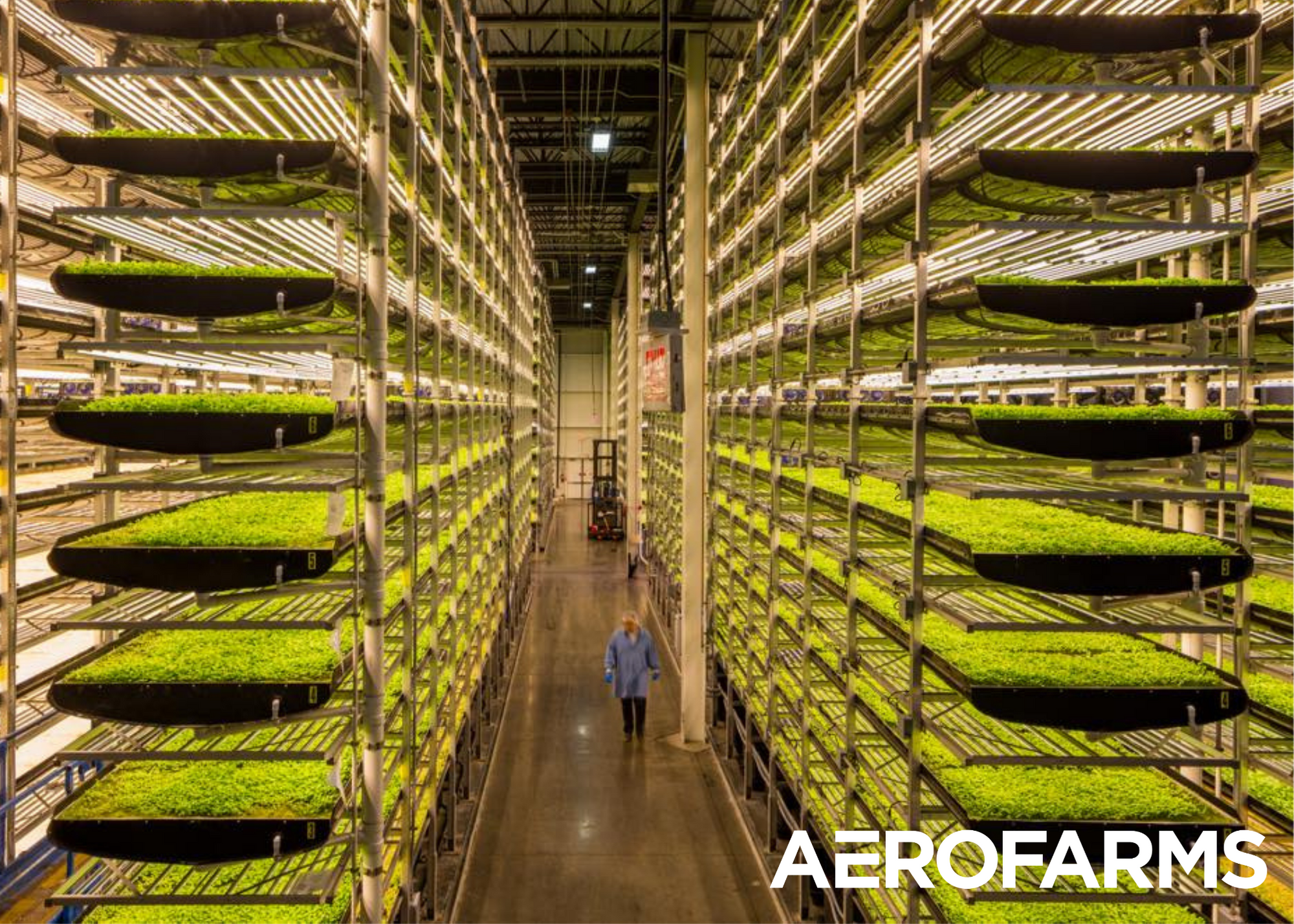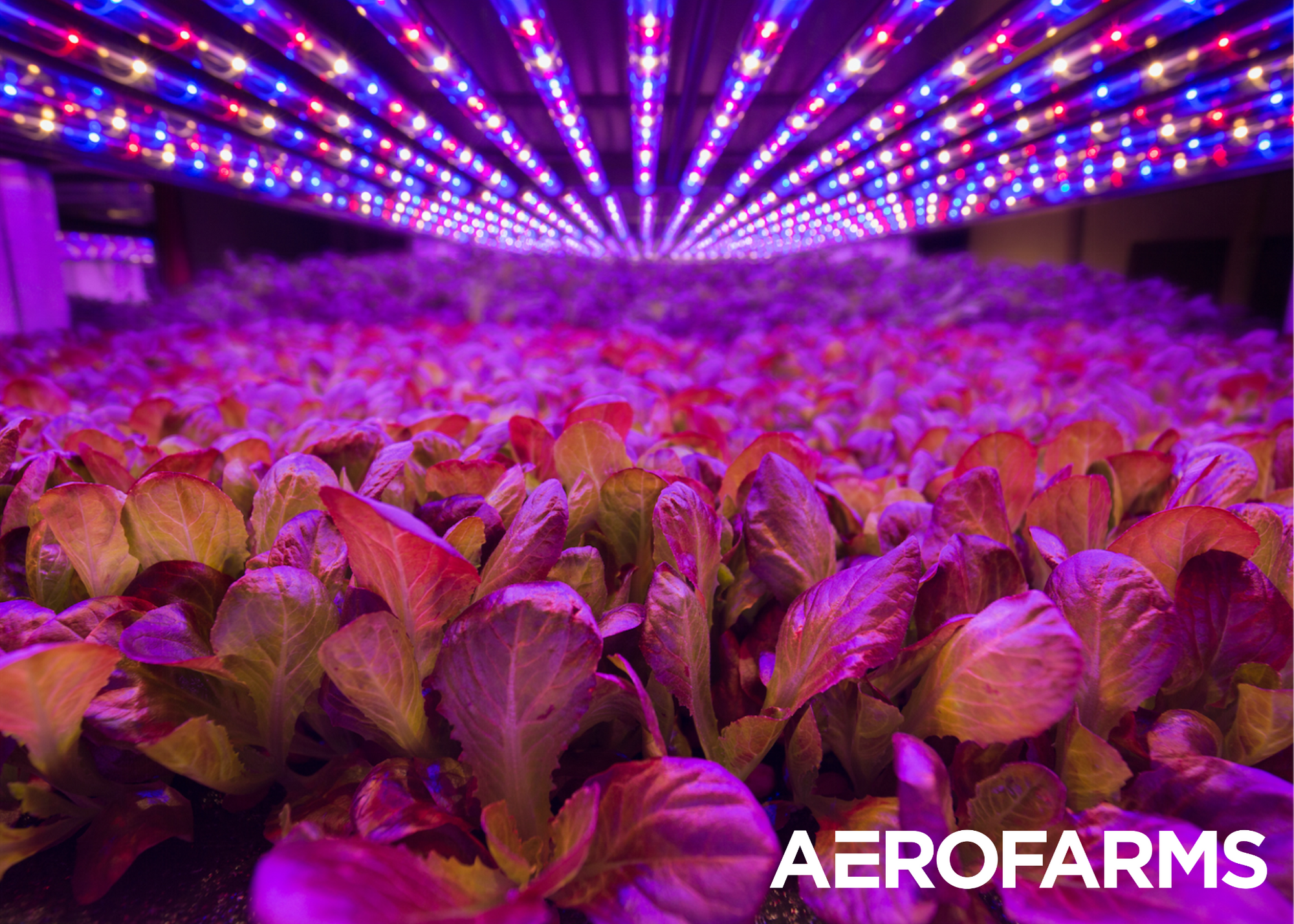How Agtech is reshaping the world
For this article, Tridge has collaborated with AeroFarms, a major Agtech company based in Newark, New Jersey. AeroFarms is an award-winning indoor farming company and Certified B Corporation on a mission to grow the best plants possible for the betterment of humanity. Using the latest breakthroughs in vertical farming, artificial intelligence, and plant biology, they are trying to fix the broken food system and improve the way fresh produce is grown and distributed locally and globally. AeroFarms has built a proprietary agriculture platform to grow a wide array of products, delivering superior flavor, better quality, and improved nutrition with the most sophisticated levels of traceability and food safety in the industry. The unique way they grow indoors creates the perfect conditions for healthy plants to thrive, allowing them to deliver the highest quality products to their customers year-round, while using up to 95% less water, 99% less land, 390X more productivity, and zero pesticides compared to traditional field farming.
The unprecedented Covid-19 pandemic in 2020 emphasized the fragile nature of international food supply chains and distribution networks, causing consumers to start to feel anxious about securing sufficient food for the future. Additionally, consumers were panic-buying essential food products and some key exporting countries implemented export bans to secure food supply for domestic consumers. Food prices spiked for staple products, meats, and processed products as a result of supply chain disruptions and climate issues. The situation worsened in countries that heavily relied on imported foods, as they were directly impacted by challenges from logistic and international trade issues.
Global society has become more alert to the complexities and uncertainties of the food supply chain as climate change, pandemic, and trade issues emerged. The unstable situation drove people to seek alternative ways to produce agricultural products, contributing to interest in sustainable production and distribution using “Agricultural Technology,” also known as Agtech. Agtech refers to innovative technology implemented in the agricultural industry that aims to combine AI, Cloud, Internet of Things (IoT), and even E-commerce with agriculture. Examples of Agtech include smart farming, vertical farming, as well as automation of monitoring, innovative irrigation systems, and harvesting systems that minimize the risk of supply chain disruption and labor cost.
When the concept of Agtech started to emerge a decade ago, less than 100 million USD was invested in the Agtech industry. However, as people became more aware of food security issues in 2013, the investment value surged, reaching 309 million USD, and in 2015, the investment value reached 1.4 billion USD. In 2020, Agtech investment totaled 3.07 billion USD as investments accelerated with the pandemic outbreak, an increase from 2.7 billion USD in 2019.
Case study: United Arab Emirates
Located in the Gulf peninsula, most of the UAE’s terrain is a mountainous and dry desert area with limited natural water accessibility. Less than 1 percent of the total land is arable, and only 2.7 percent of the total land is irrigated. Since the farming area is so limited, it is challenging to secure a sufficient food supply for the domestic market without high reliance on foreign food imports.
However, the UAE is overcoming these challenges by securing the food supply chain through the Agtech industry. According to Ralph Nehme, Senior Director at AeroFarms, the Abu Dhabi Investment Office (ADIO) has been a great support for the promotion of the Agtech industry in the UAE. ADIO has successfully attracted international Agtech companies to the UAE by supporting the establishment of R&D and production facilities through grants and rebates. On top of this, ADIO is also implementing various non-financial incentive programs such as Public-Private Partnership (PPP) with local commercial farms and universities, to boost Abu Dhabi’s agriculture technology capabilities and accelerate the growth of the AgTech ecosystem.

“Food supply chain in the UAE is extremely vulnerable as the country imports more than 85% of its food. Also, the UAE is plagued by the lack of freshwater resources; In fact, the majority of UAE’s water supply is from desalinated water and groundwater, resources that are becoming increasingly scarce or costly to produce. Therefore, the support of the local government is crucial in building resilience for food security and nutrition.”
He further added that the Agtech industry should be promoted at the international level given that traditional models are no longer sustainable and a new form of agricultural cultivation is required to feed the growing population while protecting the environment and achieving economic growth. In the past 40 years, the world has lost nearly one-third of its arable land, and the water scarcity issue is projected to affect 95% of regular farms by 2050. Greenhouse gases and the large amount of food waste generated during the production process can possibly cause ecosystem disruption in the near future, in addition to the logistics issues that complicate the global food supply chain. Following the outbreak of Covid-19, container shortages and port congestion, which created high sea freight costs, made countries with high reliance on food imports more vulnerable.
“AeroFarms has been leading commercial indoor vertical farming and agriculture since 2004 and will help alleviate the growing food crisis, not only in the UAE but also for the global society. It is really important to promote local production by adopting advanced technology to mitigate the risk arising from supply chain disruption” said Mr. Nehme. Last year, AeroFarms announced the plan to build a state-of-the-art R&D center in Abu Dhabi to conduct extensive research and development in key areas of controlled environment agriculture (CEA), promote the local economy (including the AgTech sector), and establish strategic partnerships with academic partners and industry leaders. “By adopting the aeroponic method that Aerofarm invented, we are able to achieve a much higher productivity compared to regular field farmers (up to 390 times), while using up to 95% less water and no pesticides”.
Implementing Agtech facilities will allow farmers to “grow closer to urban populations and produce all year round, regardless of seasonality,” said Mr. Nehme. As the urban population has been increasing dramatically in the past decade and the world population is projected to increase by 70% by 2050, it has become critical to attract Agtech companies in major cities to feed the growing population. Furthermore, Senior Director Nehme pointed out that technology can help reshape the agricultural industry. “Connected devices such as the Internet of Things (IoT) and sensors make it possible to gather vast amounts of data such as temperature and humidity variations, which can be used to optimize production processes. “Artificial Intelligence, Blockchain, and machine learning technology will also help reduce resources, boost yields, and improve crop resilience.”

Agtech is reshaping the food supply chain
Throughout the pandemic, we learned that food shortages can easily occur once the global supply chain is disrupted, causing prices to reach unaffordable levels. It is likely that there will be more problems disrupting the supply chain in the future, such as labor shortages, trade wars, and even climate change. Particularly, countries with a lower capacity to produce locally and less arable land will be hit harder by all these uncertainties. Therefore, it is crucial to promote the Agtech sector for these countries’ national economy and food security.
Agtech is currently reshaping the global food supply chain. Despite its arid climate and water scarcity, the UAE significantly improved food security by promoting the Agtech sector and driving innovation across the entire agriculture value chain. Agtech opens new opportunities to countries with low food self-sufficiency and high reliance on food imports. As the government of UAE promotes the industry, offering financial incentives and non-financial benefits, more Agtech and Foodtech startup companies will be attracted to the UAE, making Abu Dhabi a hub for innovative agriculture.
The UAE jumped from 31st in 2017 to 13th in 2020 on the Global Food Security Index - an imaginable feat just a few years ago. This reflects the efforts of the UAE government to transform the country into a worldwide leader in innovation-driven food security. The UAE has one of the world’s leading Agtech sectors and aims to attain the number one ranking in the Global Food Security Index by 2051.
Sources:
- Agritecture, "HERE'S HOW AGTECH WILL MAKE THE UAE MORE FOOD-SECURE BY 2021"
- Finistere Ventures, "2017 Agtech Investment Review"
- Oceanpark, "AGTECH 2019: Year in Review and Five-Year Investment Trends"
- Specialty food, "Food, AgTech Investments Near $12 Billion in 2020"
- Madarframs, "Abu Dhabi prepares for the Future of Food"
- Wamda, "ADIO allocates AED 152 million to agritech startups"
- Arabian Business, "How investments in agricultural technology are accelerating UAE's food security targets"
- Arabian Business, "How bananas could be grown in the UAE as AgTech innovations thrive"
- Gulfnews, "How agricultural tech is advancing the UAE’s food security goals"





